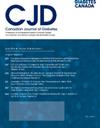Exercise and Glycemic Management in Females and Women With Diabetes: The Role of Sex and Gender Across the Lifespan
IF 2.3
4区 医学
Q3 ENDOCRINOLOGY & METABOLISM
引用次数: 0
Abstract
The benefits of exercise and physical activity (PA) for people living with diabetes are clear. However, current exercise recommendations do not take into consideration the potential impact of female-specific hormonal changes across the lifespan on the glycemic response to exercise. Moreover, the impact of life phases on barriers to participation in exercise and PA for women compared to men with diabetes is not well described. In this narrative review we have synthesized the literature to date regarding the interaction of female sex hormone variations (menarche and the menstrual cycle, pregnancy, and the menopausal transition) with glycemic management in the context of exercise for females with type 1 and type 2 diabetes. We also evaluated PA behaviours and barriers to participation in exercise and PA among individuals with diabetes identifying as women. We observed a lack of evidence regarding the impact of female-specific hormonal changes on the glycemic response to exercise among females with diabetes, with a particular paucity of studies during pregnancy and postpartum and for the menopausal transition. In this study we demonstrate that additional research is required to understand the influence of exercise on glucose management for females with diabetes across the lifespan, with the aim to provide safe and effective exercise recommendations and to encourage equitable participation in exercise and PA for females and women with diabetes throughout life.
女性和女性糖尿病患者的运动和血糖管理:性别和性别在整个生命中的作用。
锻炼和体育活动(PA)对糖尿病患者的好处是显而易见的。然而,目前的运动建议并没有考虑到女性一生中特定激素变化对运动后血糖反应的潜在影响。此外,与男性糖尿病患者相比,生活阶段对女性参与运动和PA障碍的影响尚未得到很好的描述。在这篇叙述性综述中,我们综合了迄今为止关于女性性激素变化(月经初潮和月经周期、怀孕和绝经期过渡)与1型和2型糖尿病女性运动背景下血糖控制的相互作用的文献。我们还评估了女性糖尿病患者的PA行为和参与运动和PA的障碍。我们观察到缺乏关于女性特异性激素变化对女性糖尿病患者运动后血糖反应的影响的证据,特别是在怀孕、产后和更年期过渡期间的研究。在这项研究中,我们证明需要进一步的研究来了解运动对女性糖尿病患者终生血糖管理的影响,目的是提供安全有效的运动建议,并鼓励女性糖尿病患者终生公平参与运动和PA。
本文章由计算机程序翻译,如有差异,请以英文原文为准。
求助全文
约1分钟内获得全文
求助全文
来源期刊

Canadian Journal of Diabetes
ENDOCRINOLOGY & METABOLISM-
CiteScore
4.80
自引率
4.00%
发文量
130
审稿时长
54 days
期刊介绍:
The Canadian Journal of Diabetes is Canada''s only diabetes-oriented, peer-reviewed, interdisciplinary journal for diabetes health-care professionals.
Published bimonthly, the Canadian Journal of Diabetes contains original articles; reviews; case reports; shorter articles such as Perspectives in Practice, Practical Diabetes and Innovations in Diabetes Care; Diabetes Dilemmas and Letters to the Editor.
 求助内容:
求助内容: 应助结果提醒方式:
应助结果提醒方式:


